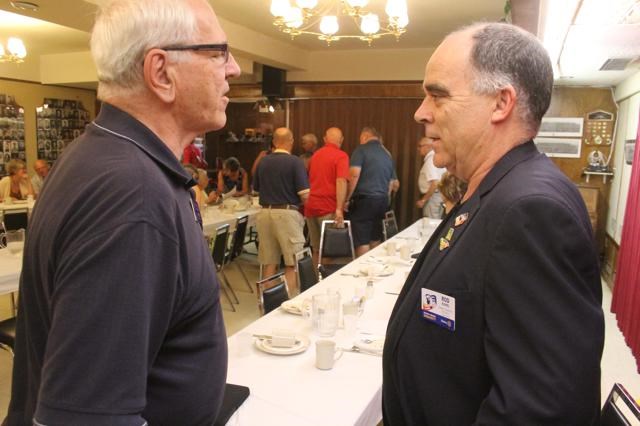Rotary Clubs are all about relationships, as well as being a force for good in the world, as evidenced by the worldwide effort to eradicate polio that is ongoing, even managing to stop a civil war for a time to allow children to be vaccinated.
These were some of the thoughts shared by Rotary District Governor Rod Riopel during his visit to the Weyburn Rotary Club on Thursday at the Weyburn Legion Hall.
A resident of Kenora, Ont., he has travelled extensively through District 5550, which extends from Saskatchewan east to Kenora, covering 5,000 km in July and 12,000 km in August as he visits every club.
“I’ve met great people. The talent we have in this district is amazing. It’s a very humbling experience, and I thank you for it,” said Riopel.
In taking training for his duties as the district governor, Riopel noted that Rotary International’s theme for this year is “Rotary Serving Humanity”, and said this has been true of Rotary since its founding over a century ago.
“Every week, 34,000 clubs and 1.2 million Rotarians come together. What happens when they meet? We laugh, we talk about different ideas, and share those ideas. It’s a family of Rotary. ‘Rotary serving humanity’ has always been a cornerstone of Rotary,” said Riopel.
One example of how this is the case was in a story where a club president got a call at 3 a.m. about the Shelterbox program, which Rotary International supports, sending family-sized tents and supplies into disaster zones, such as when an earthquake, fire or tsunami occurs. Riopel said sometimes it takes government agencies two weeks or more to get assistance on the ground when a disaster occurs, where Rotary can have action on the ground within 24 hours of a disaster.
Another example was shared from Sri Lanka, where a polio vaccination team met with government officials before beginning their vaccinations there. A government official pointed to a part of the country in the northwest corner and said this area was absolutely not accessible due to the civil war ongoing there with the Tamil Tigers guerilla group. A Rotary representative asked if they could inquire about going into that area, and the official was incredulous, insisting that there was no way the parties involved there would ever agree to safe conduct for a team wanting to go in to vaccinate children.
A letter was sent anyway, and a letter came in reply from the Tigers, stating, “Our war has never been with children.”
They granted a three-day cease-fire, plus safe conduct for the team of volunteers to go in and provide vaccinations to the children in that area.
“You belong to an organization that literally stopped a war for three days so we could go in and immunize children,” said Riopel. “Limitations are only those you place on yourself. If you think you can do it, then you go ahead and do it.”
The fight against polio is recognized with support from the Bill Gates Foundation and the federal government, so that for $1 donated by Rotary, that becomes $5 when matched by both the government and the Gates Foundation.
Other examples of good that Rotary does is with the “Ripple Effect” program in countries like Guatemala, where schools are being built and helping children.
Rotary Clubs don’t need more members, said Riopel, but they need more people who are passionate about helping, and are willing to do the volunteer work involved.
With that said, he noted that District 5550 has a membership of 1,545, with a goal for the year to raise $180,000 for their various projects, and $80,000 for polio eradication.



